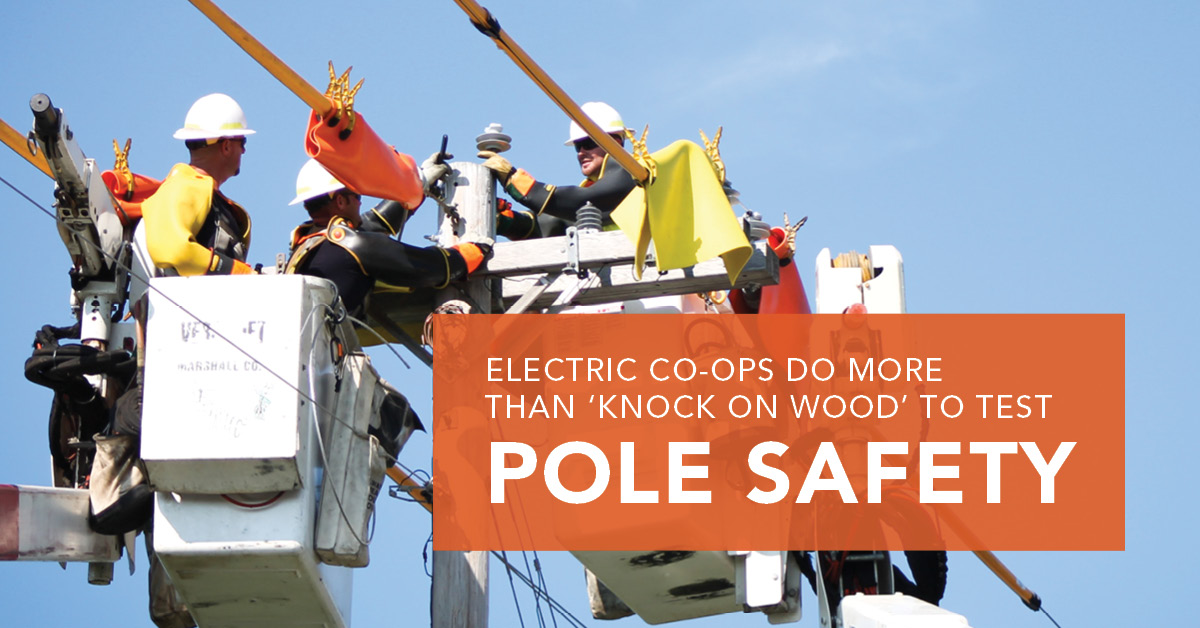
Spring has arrived with its profusion of color: whites and pinks … and orange — as in the orange of work zones.
The National Work Zone Awareness Week is April 11-15 to remind motorists to be careful around those men and women whose jobs put them along the roadways and into harm’s way. But not all work zones are for road repair. Indiana’s electric cooperatives note utility crews also work along the roadsides to build, repair and maintain the highway of electric power lines. Sometimes, crews can be around the next corner or just over the hill — day or night.
“While routine line work is done during daylight hours, emergencies happen at any time,” said John Gasstrom, CEO of Indiana Electric Cooperatives. “We want to remind motorists our crews can be out working at all hours. Please be careful when you see warning signs and flaggers.”
When motorists see the orange diamond-shaped work zone warning signs and vehicles with the flashing amber lights, they should slow down and prepare for the zone ahead.
Indiana law requires motorists to approach cautiously and change lanes away from the emergency vehicles if they can do so safely. If not, they should reduce their speed to 10 mph under the posted speed limit and proceed with caution. Motorists should not stop in the roadway; this may cause a chain reaction rear-end collision with other vehicles.
Emergency vehicles protected by the law include:
- Police vehicles
- Ambulances
- Fire trucks and rescue equipment
- Highway incident-response vehicles
- Highway maintenance vehicles
- Utility service vehicles
- Tow trucks
Violating the law can result in a fine and a suspended license. Steeper penalties, including jail time, are enforced for infractions within highway work zones.
Though move-over laws are only for emergency vehicles, drivers should always be courteous to those parked on the shoulder. Give them room to safely repair their vehicles and help prevent tragedies.
“Working on energized power lines at all hours and in all kinds of weather is dangerous enough for lineworkers,” Gasstrom added. “Please don’t make it more dangerous by speeding so closely by them.”
Sources: Indiana State Police, Workzonesafety.org, moveoverlaws.com
Slow down driving through work zones — it’s the law!
The Indiana Work Zone Safety Law sets steep penalties for driving infractions within highway work zones. Here are the consequences if you’re caught breaking the law:
- First time citations for speeding in a work zone result in a $300 fine. The fine increases to $500 for a second offense and $1,000 for a third offense within three years.
- Motorists who drive recklessly or aggressively through a work zone face fines up to $5,000.
- Drivers who injure or kill a highway worker may end up paying a $10,000 fine and serving up to six years behind bars.
Source: www.in.gov
Tips for driving safely in work zones
- Pay attention and expect the unexpected. Work zone configurations can change without notice.
- Don’t text or talk on the phone and avoid taking your hands off the wheel.
- Watch for speed limit reductions, narrowing lanes, changing traffic patterns, and – most importantly – highway workers.
- Respect the posted speed limits and safely merge as soon and as safely possible. This will allow traffic to flow smoothly.
- Keep in mind: driving 45 mph, instead of 55 mph, through a 5-mile work zone will only add 1.2 minutes to your trip. Speeding and aggressive driving are major causes of work zone crashes.
- Keep a safe distance on all sides of your vehicle, and maintain a safe following distance. Rear-end collisions are the most common type of work zone crash.
- Respect the flaggers and obey their guidance. Be patient when driving through work sites with flagger control.
- Pay attention to the road signs. Those signs are carefully selected to give drivers accurate information and important warnings.
- Expect delays and allow extra travel time to travel through work zones.
- Select alternate routes if possible to avoid the work zone completely.
Source: www.in.gov





